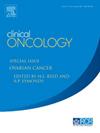Neoadjuvant Treatment of Rectal Cancer: A Repeat UK-wide Survey After Implementation of National Intensity Modulated Radiotherapy Guidance
IF 3.2
3区 医学
Q2 ONCOLOGY
引用次数: 0
Abstract
Aims
Rectal cancer management has changed significantly in the last decade with the introduction of total neoadjuvant therapy (TNT), minimally invasive surgery, brachytherapy, and organ preservation. A national survey of intensity modulated radiotherapy (IMRT) was carried out in 2020 to support the development of national Royal College of Radiologists (RCR) guidance, published in 2021. We performed a repeat survey in collaboration with the RCR, to inform iterations of the RCR Guidance and establish treatment patterns across the UK to facilitate future research and development.
Materials and Methods
A web-based survey was developed and tested by the authors prior to dissemination by the RCR to all UK radiotherapy centres. The repeat survey requested details and strategies of current radiotherapy techniques, including details on setup, doses, organs at risk, peer review, and verification, and asked for the standard management of 5 clinical cases within each multidisciplinary team (MDT) serving that radiotherapy centre. Descriptive statistical analysis was carried out.
Results
In total, 42 of 60 (70%) of the NHS centres across the UK answered the repeat IMRT rectal survey, which reflected 70 MDTs answering the clinical scenarios questions. 100% of centres that responded are routinely using IMRT, with 95% of centres using it in all patients. Variation in treatment delivery has reduced since the previous survey. The greatest difference is still in the use of simultaneous integrated boost and definition of organs at risk. The management for the clinical cases was widely different, with answers generally equally distributed between 2-4 options. The highest-scoring treatment strategies ranged from 24% to 57%.
Conclusion
RCR guidance has helped standardise the delivery of radiotherapy to treat rectal cancer in the UK. The variation in neoadjuvant treatment represents an exciting, evolving time in rectal cancer management. Clinical trials are needed to further homogenise treatment, but a degree of national variation is likely to continue.
直肠癌的新辅助治疗:在实施国家调强放疗指南后的英国范围内的重复调查
目的:在过去十年中,随着全面新辅助治疗(TNT)、微创手术、近距离治疗和器官保存的引入,直肠癌的治疗发生了重大变化。2020年开展了调强放疗(IMRT)全国调查,以支持国家皇家放射科医师学院(RCR)指南的制定,该指南于2021年发布。我们与RCR合作进行了一次重复调查,为RCR指南的迭代提供信息,并在英国建立治疗模式,以促进未来的研究和开发。材料和方法在RCR向所有英国放射治疗中心传播之前,作者开发并测试了一项基于网络的调查。重复调查要求了解当前放疗技术的细节和策略,包括设置、剂量、有风险的器官、同行评审和验证的细节,并要求在为该放疗中心服务的每个多学科小组(MDT)内对5例临床病例进行标准管理。进行描述性统计分析。结果,英国60家NHS中心中有42家(70%)回答了重复IMRT直肠调查,反映了70名mdt回答了临床情景问题。100%有反应的中心常规使用IMRT, 95%的中心对所有患者使用IMRT。自上次调查以来,提供治疗的差异有所减少。最大的区别仍然是使用同时集成的增强和危险器官的定义。对临床病例的处理有很大的不同,答案一般平均分布在2-4个选项之间。得分最高的治疗策略从24%到57%不等。结论rcr指南有助于规范英国直肠癌放疗方案的实施。新辅助治疗的变化代表了直肠癌管理中一个令人兴奋的、不断发展的时代。需要进行临床试验以进一步使治疗均一化,但可能会继续存在一定程度的国家差异。
本文章由计算机程序翻译,如有差异,请以英文原文为准。
求助全文
约1分钟内获得全文
求助全文
来源期刊

Clinical oncology
医学-肿瘤学
CiteScore
5.20
自引率
8.80%
发文量
332
审稿时长
40 days
期刊介绍:
Clinical Oncology is an International cancer journal covering all aspects of the clinical management of cancer patients, reflecting a multidisciplinary approach to therapy. Papers, editorials and reviews are published on all types of malignant disease embracing, pathology, diagnosis and treatment, including radiotherapy, chemotherapy, surgery, combined modality treatment and palliative care. Research and review papers covering epidemiology, radiobiology, radiation physics, tumour biology, and immunology are also published, together with letters to the editor, case reports and book reviews.
 求助内容:
求助内容: 应助结果提醒方式:
应助结果提醒方式:


